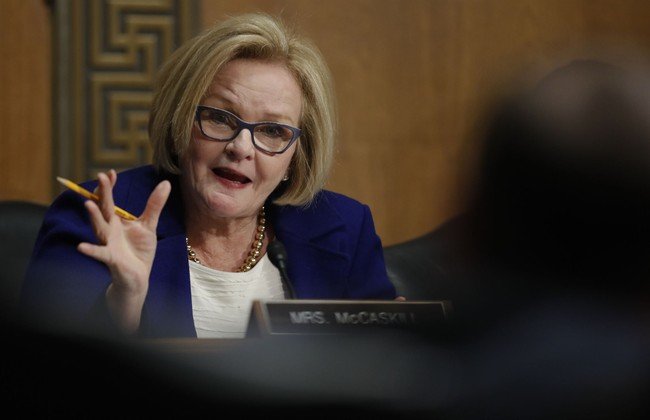In a few months, as the pressure of midterm elections weighs on a handful of incumbent Democratic senators in states President Trump won in 2016, pundits may begin to recall that meeting at the White House on a chilly January afternoon and wonder whether they missed something critical.
Immediately after the televised meeting on January 9, everyone discussed the meeting live and freelanced, focusing on theatrics. They openly speculated that Trump had organized the meeting to dispel any notion that he was sane.
Once again, pundits have missed the subtle nuances of just how much American politics have changed — and what consequences that could have for future outcomes.
Notably, three Democratic officials in states that strongly supported Trump in 2016 — Indiana Sen. Joe Donnelly, West Virginia Sen. Joe Manchin and Missouri Sen. Claire McCaskill — were absent. Senators McCaskill and Manchin said they were not invited to the White House event.
Typically, lawmakers representing states that voted for the other party’s presidential candidate are the most bipartisan — even if it’s just listening. Early on, Sen. Heidi Heitkamp of North Dakota and Sen. Donnelly hopped on a plane with Trump. But now, as they’re in the throes of fundraising, they want nothing to do with it.
They have chosen donors in California and New York over voters at home. They could go to great lengths to find places where they can work productively with the president, but the closer the election gets, the further they drift from the White House.
It’s another example of how U.S. Senate elections have changed: They’re now national elections, and most of the candidates’ money comes from outside their state. The result: They focus on their real constituency, their national donor base. In turn, they ignore the people in the states they represent.
There is not a single Democratic incumbent whose constituents and union members in their state would not want to see Trump partner on infrastructure. You know who wouldn’t? High-net-worth donors in San Francisco, New York, and Los Angeles.
If any of these senators were anywhere near Trump, all of these donors would abandon them in a heartbeat. They’re essentially asking McCaskill and Donnelly to perform an act of levitation: win by not doing what voters want you to do.
The question is, will voters hold incumbents accountable? They assume that voters won’t. They assume that Trump is so polarized that there are no Trump voters available to them on a positive scale. They think that they’re going to have to destroy their opponent, tear him apart.
But think about the margins here. Trump won Indiana and Missouri by more than 18 points. He won North Dakota by more than 30 points and West Virginia by more than 40 points. He won Ohio by 10 points. It’s not that they would need just a few Trump voters to stay home; they would need a lot of them — about a third of them — to stay home. And that’s just not going to happen.
So why don’t they even pretend? Why don’t they say, “Oh, I really want to work with the president. I want to be bipartisan. I think we have to work with the president. Here’s something the president likes and I like”?
They didn’t even go to the damn meeting.
If Republicans are clever enough to pay attention to what wasn’t happening in the White House this week, they will eliminate ads that play up those divides by showing that vulnerable Democrats had the chance to be nonpartisan but chose not to.
Michigan Democratic Sen. Debbie Stabenow’s statement on Michigan’s tax cuts is a perfect example of this risk. When the tax reform bill passed the Senate delayed last year, Stabenow issued a statement that read: “I’ve said from the beginning that we need tax reform that simplifies the tax system, puts more money in people’s pockets, closes tax loopholes that send jobs overseas, and supports small businesses and farms across Michigan. Unfortunately, that’s not what this Republican bill does at all.”
On January 11, Fiat Chrysler Automobiles announced it would invest $1 billion to modernize its Warren Truck Plant in Detroit, creating 2,500 jobs and moving production of Ram Heavy Duty trucks out of Mexico. The company also announced it would pay a $2,000 bonus to its hourly and salaried employees in the U.S. The company attributed the moves to the modern tax law.
Maybe the incumbents’ calculus is working. Maybe not. But it’s another gem of American politics that’s changing: the calculus that what your donors in New York and California want you to say and do carries more weight than what your constituents want you to do to improve the state.
Michigan voters are no doubt wondering what influence her donors had on Stabenow’s decision not to support the tax bill.


